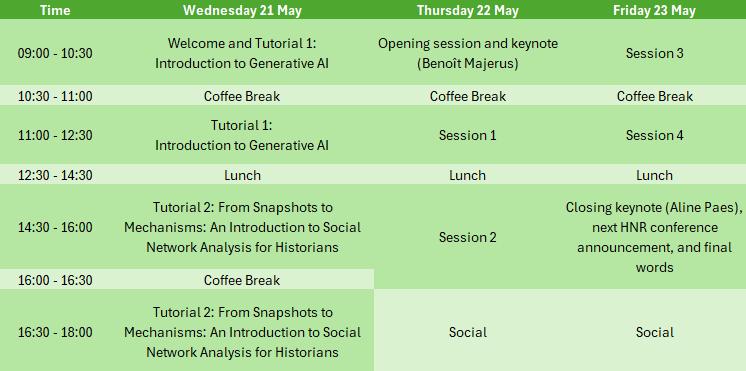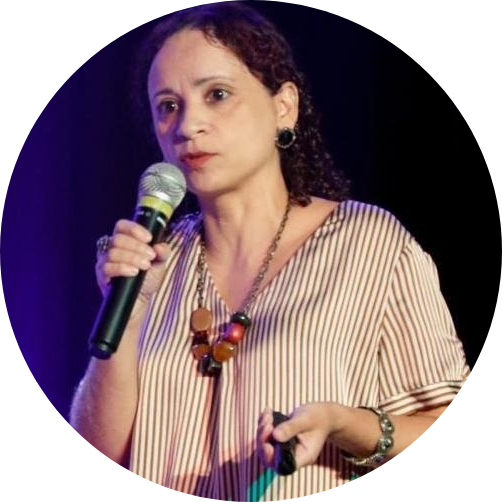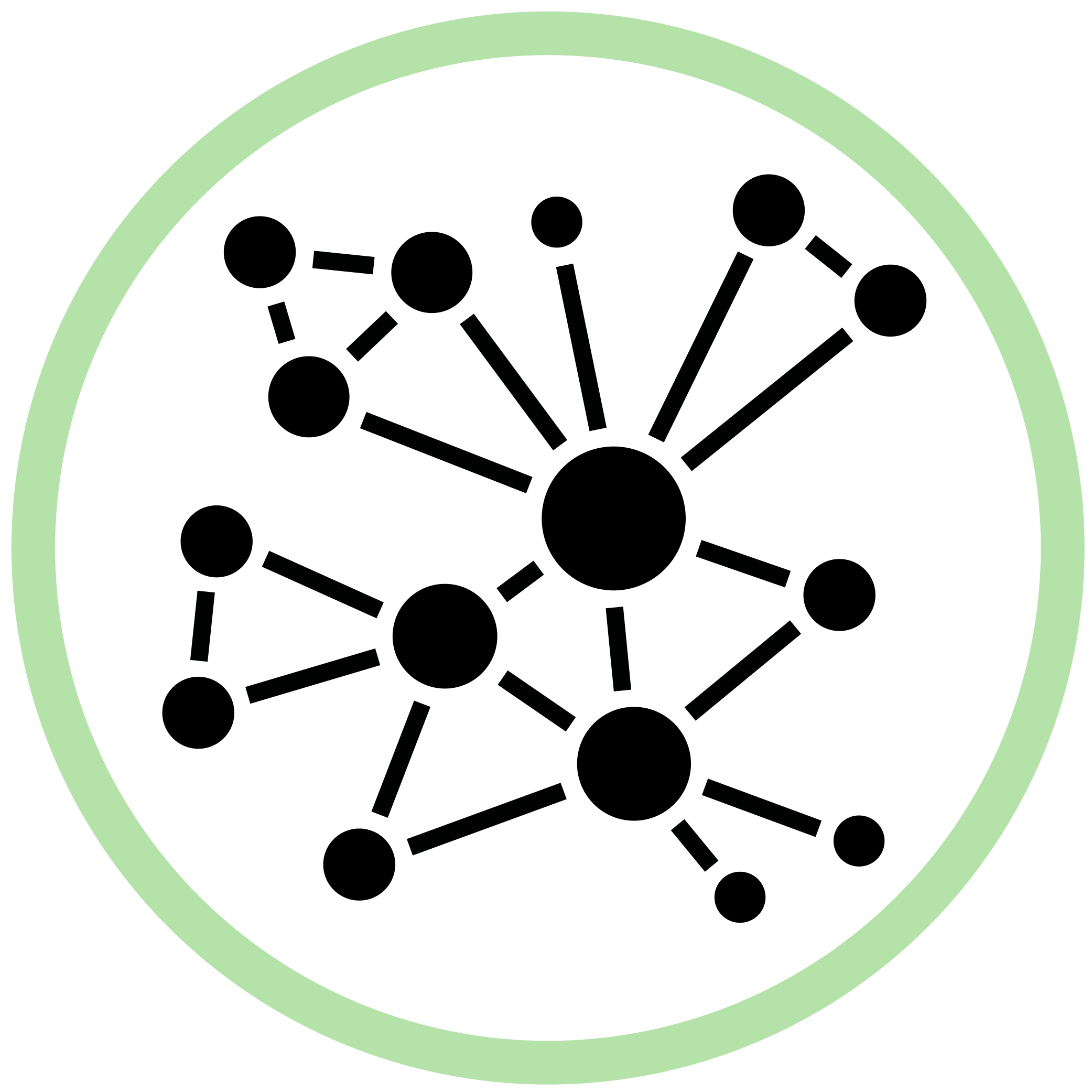Program
The program of the Historical Network Research Conference 2025 includes 20 papers, two keynotes and two tutorials. Please note that tutorial registration is separate from the conference registration (but also free of charge)!
Keynotes
Making shell companies visible. Digital history as a tool to unveil global networks and local infrastructures
Benoît Majerus works as a historian at the Center for Contemporary and Digital History. In the last three years, he has research on a project at the intersection of Digital and Financial History. In LETTERBOX, he used digital methods to reveal how Luxembourgish shell companies have been incorporated since the interwar period in global tax avoidance schemes.
Is AI in low-resource contexts still a realistic pursuit? Absolutely — and necessary
Aline Paes is an Associate Professor at the Institute of Computing at the Fluminense Federal University (UFF), Brazil. She earned her Master’s and Ph.D. degrees in Computer Science and Systems Engineering, focusing on Artificial Intelligence, from COPPE-Systems at the Federal University of Rio de Janeiro (UFRJ). During her Ph.D., she spent a year as a visiting researcher at Imperial College London. Currently, she holds a Jovem Cientista do Estado do Rio de Janeiro (Young Scientist of the State of Rio de Janeiro) fellowship from FAPERJ and a research productivity fellowship from CNPq. Her research in Artificial Intelligence spans multiple areas, including machine learning integrated with neural, statistical, and logical approaches; representation learning and language models; model adaptation and transfer learning; explainable AI; and AI applications for positive social impact. Aline Paes serves on the editorial boards of the Machine Learning Journal, the Ibero-American Journal of Artificial Intelligence, and the Journal of the Brazilian Computer Society. She was recently awarded FAPERJ’s inaugural research grant for Young Women Scientists. In 2023, she was a visiting professor at the Natural Language Processing Group at the University of Sheffield, supported by a CAPES scholarship. Since 2020, she has been a member of the Brasileiras em PLN (Brazilian Women in NLP) group.
Wedsneday 21 May
Tutorial Day!
09:00 - 09:10 Welcome to Rio and to the Forum de Ciência e Cultura
09:10 - 12:30 Tutorial 1
Introduction to Generative AI (Thiago Castro Ferreira)
14:30 - 18:00 Tutorial 2
From Snapshots to Mechanisms: An Introduction to Social Network Analysis for Historians (Charles Kirschbaum)
Thursday 22 May
09:00 - 09:10 Welcome to HNR2025
09:10 - 10:30 Opening Keynote
Making shell companies visible. Digital history as a tool to unveil global networks and local infrastructures (Benoît Majerus)
11:00 - 12:30 Session 1
- 11:00 - 11:20 Cliental Network of Biała Podlaska 1702-1709: An Attempt at Qualitative Analysis of Patronage Networking (Jan Siwoń)
- 11:20 - 11:40 High Middle Ages Aristocratic Networks through Alcuin’s Letters and Digital Methods (c. 790-804) (Renato Da Silva)
- 11:40 - 12:00 Institutional Development and the Dynamics of Power Through Time (Héctor Gutiérrez Magaña, Jesús Espinal-Enríquez)
- 12:00 - 12:30 A Data Visualization Platform for Analyzing Social Relations in 19th-century Alegrete (Paulo Roberto Scheuer Gomes, Laura Vargas Dicheti, Carla Maria Dal Sasso Freitas)
14:30 - 16:30 Session 2
- 14:30 - 15:00 Analyzing political-religious criminality during the Dollfuß-/Schuschnigg-Regime – A case study of LLM-assisted historical network research (Cindarella Petz)
- 15:00 - 15:30 Identifying prominent actors in historical networks: The case of the New Education Movement (Lauri Luoto)
- 15:30 - 16:00 Network information extraction from medieval trial records combining LLM-based coreference resolution with string matching in pre-existing lists of persons (David Zbíral, Gideon Kotzé, Zoltán Brys, Robert L. J. Shaw, Tomáš Hampejs, Andres Karjus)
- 16:00 - 16:30 Political entanglements. A network study on contracts, power, and defection in Renaissance Italy’s warfare market (Criveller Margherita, Federico Bianchi, Raffaele Vacca, Flaminio Squazzoni)
Friday 23 May
09:00 - 10:30 Session 3
- 09:30 - 09:50 Breaking the Surface. Uncovering Mechanisms, Practices and Dynamics of Historical Engagement in the City of Cologne (Annika Häberlein)
- 09:50 - 10:10 Exploring the Nature of Science through Data and Connections: Introducing Historical Network Analysis in Brazilian High School Physics Education (Marlon C. Alcantara, Leonardo Domingos)
- 10:10 - 10:30 Mapping Medieval Mazovia’s Trade Networks: Reconstructing Economic and Social Dynamics through Data Analysis (Karol Banach)
11:00 - 12:30 Session 4
- 11:00 - 11:20 Introducing High School Students to Historical Network Research: A Pedagogical Framework (Juliane T. Moraes, Marlon C. Alcantara, Hudson W. Ferreira)
- 11:20 - 11:40 The Succession of Mysticism during the Formative Period of Islamic Reformism (Yuri Ishida)
- 11:40 - 12:10 Networks of Named Entities in Large Press Collections: Epistemological and Methodological Challenges (Martin Grandjean)
14:30 - 15:50 Closing Keynote
Is AI in low-resource contexts still a realistic pursuit? Absolutely — and necessary (Aline Paes)
15:50 - 16:00 HNR2026 Announcement
16:00 - 16:30 Final Words



